Venezuela: Social programs expanded in poorest communities
The Venezuelan government has initiated its policy of expanding social programs in the country’s most deprived areas in a bid to eradicate extreme poverty, Venezuelanalysis.com said on June 30.
The initiative, called “Red Sundays”, involves teams of social program workers visiting poorer communities every Sunday to diagnose which households are deprived of certain basic needs and which social programs are required to attend to these needs.
-
-
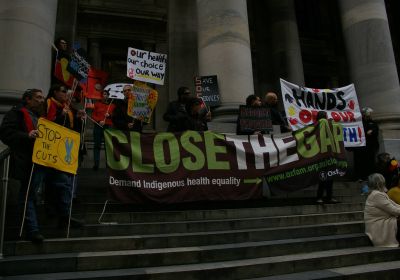 About 250 Aboriginal people and their supporters gathered in solidarity at the steps of South Australia’s Parliament House on June 17 to protest against the proposed federal budget. Included in the budget is $534 million in cuts to Aboriginal programs around the country. The rally was organised by Narungga elder Tauto Sansbury.
About 250 Aboriginal people and their supporters gathered in solidarity at the steps of South Australia’s Parliament House on June 17 to protest against the proposed federal budget. Included in the budget is $534 million in cuts to Aboriginal programs around the country. The rally was organised by Narungga elder Tauto Sansbury. -
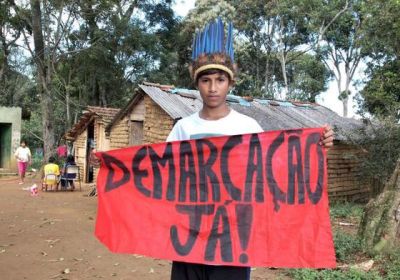 A 13-year-old boy from Brazil’s Guarani tribe makes a political stand in front of 70,000 football fans and what he thinks is an international audience. A movement led by indigenous women in the United States beats a billion-dollar brand of the big, bad NFL. These two stories share more than the fact that they took place during the same week. They share the ways that people in power have sought to combat their courage by trying to render them invisible.
A 13-year-old boy from Brazil’s Guarani tribe makes a political stand in front of 70,000 football fans and what he thinks is an international audience. A movement led by indigenous women in the United States beats a billion-dollar brand of the big, bad NFL. These two stories share more than the fact that they took place during the same week. They share the ways that people in power have sought to combat their courage by trying to render them invisible. -
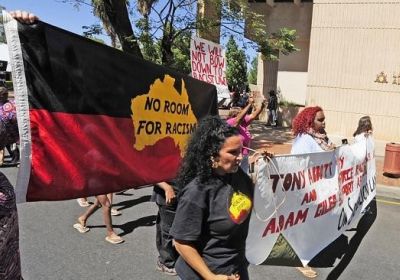 It has been seven years since the federal government introduced the Northern Territory intervention. To mark the date, a protest was held outside Alice Springs courthouse on June 21, demanding an end to the intervention, now known as Stronger Futures, and an end to income management.
It has been seven years since the federal government introduced the Northern Territory intervention. To mark the date, a protest was held outside Alice Springs courthouse on June 21, demanding an end to the intervention, now known as Stronger Futures, and an end to income management. -
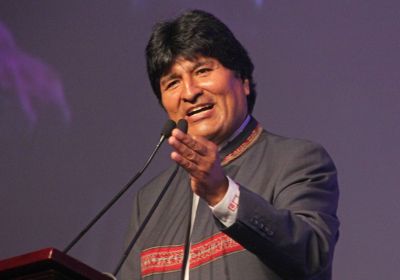 The Summit of the Group of 77 plus China, marking the alliance’s 50th anniversary, closed in Santa Cruz, Bolivia, on June 15 with the adoption of a declaration entitled “For a New World Order for Living Well”. There were delegates from 104 nations out of the 133 from the global South that now make up the Group of 77 plus China. Bolivia is chairing the alliance this year, and its president, Evo Morales, hosted the summit.
The Summit of the Group of 77 plus China, marking the alliance’s 50th anniversary, closed in Santa Cruz, Bolivia, on June 15 with the adoption of a declaration entitled “For a New World Order for Living Well”. There were delegates from 104 nations out of the 133 from the global South that now make up the Group of 77 plus China. Bolivia is chairing the alliance this year, and its president, Evo Morales, hosted the summit. -
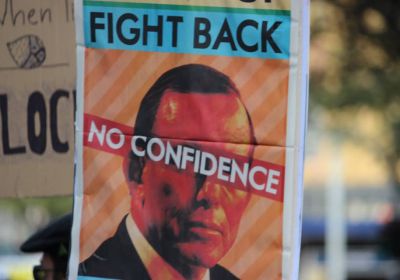 LIFE FOR MOST AUSTRALIANS IS GETTING HARDER, WHILE POLITICIANS SERVE THE WEALTHY. BUT PUBLIC BACKLASH IS BREWING INTO A MOVEMENT TO CHALLENGE THIS SYSTEM, WRITES SUSAN PRICE. In handing down its first budget, the Coalition government echoed its National Commission of Audit, warning that a “business as usual” scenario for public spending on welfare, pensions, public services, health and education is “unsustainable”, even “irresponsible” in Australia today.
LIFE FOR MOST AUSTRALIANS IS GETTING HARDER, WHILE POLITICIANS SERVE THE WEALTHY. BUT PUBLIC BACKLASH IS BREWING INTO A MOVEMENT TO CHALLENGE THIS SYSTEM, WRITES SUSAN PRICE. In handing down its first budget, the Coalition government echoed its National Commission of Audit, warning that a “business as usual” scenario for public spending on welfare, pensions, public services, health and education is “unsustainable”, even “irresponsible” in Australia today. -
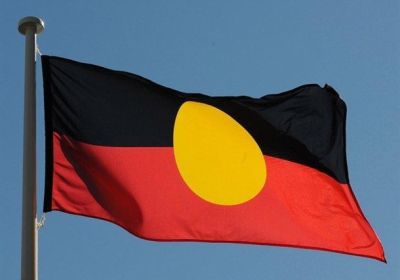 At its national conference over June 7-9, the Socialist Alliance adopted an amendment to its Charter of Aboriginal and Torres Strait Islander Rights, which stated that it does not support Constitutional recognition in the current form put forward by the government and the Reconciliation Australia initiative Recognise. The policy now states that Constitutional recognition must be accompanied by sovereignty, land rights and a treaty.
At its national conference over June 7-9, the Socialist Alliance adopted an amendment to its Charter of Aboriginal and Torres Strait Islander Rights, which stated that it does not support Constitutional recognition in the current form put forward by the government and the Reconciliation Australia initiative Recognise. The policy now states that Constitutional recognition must be accompanied by sovereignty, land rights and a treaty. -
Ecuador accused US scientists on June 16 of taking thousands of unauthorised blood samples from indigenous Huaorani and selling them. The Huaorani are known for a unique genetic profile and disease immunity and the samples are believed to have been sold by the Coriell Institute for Medical Research to Harvard University Medical School. Ecuador’s constitution bans the use of genetic material and scientific research in violation of human rights.
-
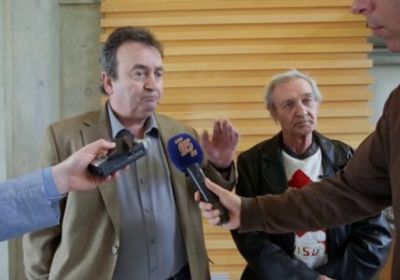
In 2011, the Maritime Union of Australia invited leaders of the Miscarriages Of Justice Organisation (MOJO) in Britain to Australia — Gerry Conlon, Paddy Joe Hill and John McManus.
-
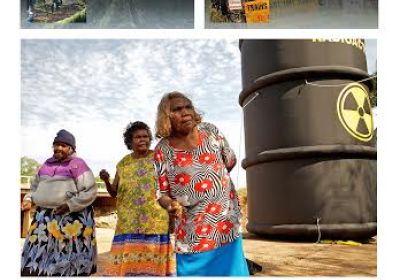 The Environment Centre NT released this statement on June 19. *** The Environment Centre NT welcomes news that the Northern Land Council and the federal government have agreed not to act on the nomination to establish a nuclear waste dump on Aboriginal land at Muckaty.
The Environment Centre NT released this statement on June 19. *** The Environment Centre NT welcomes news that the Northern Land Council and the federal government have agreed not to act on the nomination to establish a nuclear waste dump on Aboriginal land at Muckaty. -
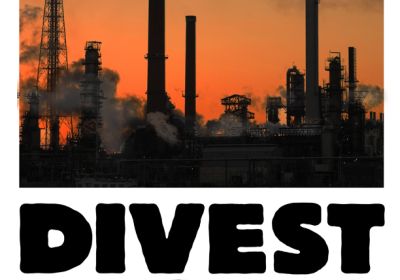 Moreland council has threatened to divest from any bank that invests in fossil fuel projects. Since 2008, the big four banks — Commonwealth, ANZ, Westpac and NAB — have invested $18.8 billion in fossil fuel projects in Australia. Moreland council has traditionally banked with the Commonwealth Bank, which provides more than $1 billion to new projects that will ship coal and gas through the Great Barrier Reef.
Moreland council has threatened to divest from any bank that invests in fossil fuel projects. Since 2008, the big four banks — Commonwealth, ANZ, Westpac and NAB — have invested $18.8 billion in fossil fuel projects in Australia. Moreland council has traditionally banked with the Commonwealth Bank, which provides more than $1 billion to new projects that will ship coal and gas through the Great Barrier Reef. -
 When Muckaty traditional owners first heard about a proposed waste dump on their land seven years ago, it didn’t seem like such a bad idea. Many thought it was a general rubbish tip that would recycle, sell reclaimed materials and provide work opportunities for people living in the remote area of the Northern Territory. Millions of dollars were promised for roads and scholarships. In an area with few employment prospects or education opportunities, it is little wonder the offer seemed attractive.
When Muckaty traditional owners first heard about a proposed waste dump on their land seven years ago, it didn’t seem like such a bad idea. Many thought it was a general rubbish tip that would recycle, sell reclaimed materials and provide work opportunities for people living in the remote area of the Northern Territory. Millions of dollars were promised for roads and scholarships. In an area with few employment prospects or education opportunities, it is little wonder the offer seemed attractive.